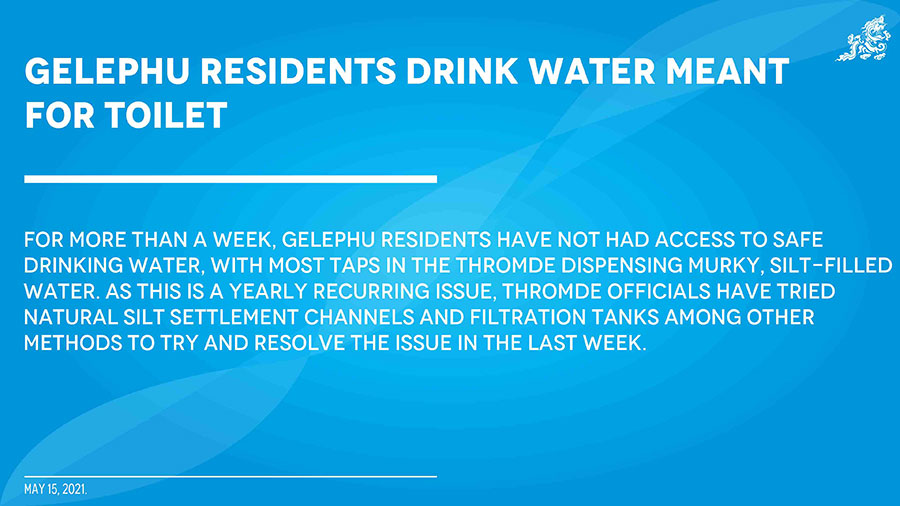Nima | Gelephu
Residents in Gelephu know summer has begun when their taps discharge murky water. For more than a week, thromde residents have been served unsafe drinking water.
Washbasins in restaurants, bakeries and most of the taps are filled with silt. Residents said the water couldn’t even be used for washing dishes.
Many residents have been buying bottled mineral water for drinking and cooking. A few restaurants resorted to serving meals on plastic plates without enough water supply.
A bakery owner in the core town, Sangay, said that the thromde faced water problems around this time every year still the issue remains unsolved. “The situation has not improved. I have to buy water every day. It’s better to stop the unit than spend most of the time fetching water,” he said.
He added that children living in the thromde were more at risk. “The grown-ups would know if the water is unsafe for drinking but not the children. They are vulnerable to all sorts of infection in such a situation,” he said.
The business owner said that he complained to the thromde administration but there was no response from the concerned officials yet.
A hotel owner in the town, Dorji Lhaden, said that her staff had to boil water for drinking. “It’s difficult to maintain cleanliness without a clean water supply. We couldn’t even wash dishes with it,” she said.
The most affected were hotels operating as facility quarantine. Few hotels get water only in the morning and evening.
Gelephu Thromde officials said that supplying water was challenging after the dredging activities disturbed buffer areas of the treatment plant at Maochhu, which caters to about 80 percent of water demand in the town.
Head of thromde’s water section, Karma Wangdi, said that boulder extraction activities that involved heavy machinery damaged the water seepage network, leading to a collection of muddy water at the infiltration gallery.
“The whole stretch of water up to the source is muddy. It is beyond our capacity for now. We tried everything within our capacity. So, we thought of releasing the water for toilet use rather than not having water at all,” he said.
He added that there was no use pumping the water and backwashing it because of the sediment content. “It would cause damage to pumps. It is difficult to complete the treatment process,” said Karma Wangdi.
Officials said that the quality of the water supply would improve within a day or two.
“There was underground seepage in the past at the infiltration gallery. The water reaching the galley used to be clean and easily filtered before. But the water is muddy now. There is no use filtering it,” said an official at the treatment plant.
For the past week, thromde officials tried natural silt settlement channels, rapid sand filtration tank, slow filtration tank, and gallery ponds.
“The flash flood that occurred close to the treatment plant last summer could have disturbed the seepage,” said Karma Wangdi. “The only alternative is to bring water from Balukhola. We are trying to pump water from Zomlingthang and LAP-IV to meet the immediate need.”
Water quality is expected to improve after June.
Gelephu Thromde depends on Passangchu, Maochhu water treatment plant, and bore wells for drinking water. The thromde is also planning to tap water from Balukhola.


